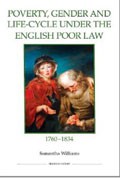From the publishers:
Social welfare, increasingly extensive during the seventeenth and eighteenth centuries, was by the first third of the nineteenth under considerable, and growing, pressure, during a 'crisis' period when levels of poverty soared. This book examines the poor and their families during these final decades of the old Poor Law. It takes as a case study the lived experience of poor families in two Bedfordshire communities, Campton and Shefford, and contrasts it with the perspectives of other participants in parish politics, from the magistracy to the vestry, and from overseers to village ratepayers. It explores the problem of rising unemployment, the provision of parish make-work schemes, charitable provision and the wider makeshift economy, together with the attitudes of the ratepayers. That gender and life-cycle were crucial features of poverty is demonstrated: the lone mother and her dependent children and the elderly dominated the relief rolls. Poor relief might have been relatively generous but it was not pervasive – child allowances, in particular, were restricted in duration and value – and it by no means approximated to the income of other laboring families. Poor families must either have had access to additional resources, or led meager lives.
From napoleon.org:
This study raises an interesting issue regarding the writing of history of the First Empire. Williams' book stands firmly within a British historiographical tradition of writing on social and economic history of the modern period. Perhaps the novelty of her approach is that it includes gender in her case study of “the lived experience of poor families in two Bedfordshire communities, Campton and Shefford” in which she contrasts this experience “with the perspectives of other participants in parish politics, from the magistracy to the vestry, and from overseers to village ratepayers.” Those who work on France in the Napoleonic period would be exceedingly interested to read a similar study for a specific French department. The only recent work on the poor during the Consulate and First Empire is Chantal Prévot's work on “Les Paysans” (Nouveau Monde Editions/Fondation Napoléon 2010). When can we move on from hearing about notability in French provinces to hear about poor relief and parish politics in France?
Poverty, Gender and the Life-Cycle under the English Poor Law, 1760-1834
Author(s) : WILLIAMS Samantha

- Year of publication :
- 2011
- Place and publisher :
- Royal Historical Society
- Number of pages :
- 240

